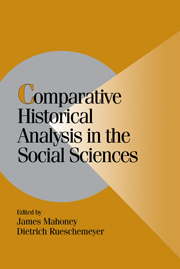Book contents
- Frontmatter
- Contents
- Contributors
- Preface
- Introduction
- I Accumulation of Research
- 2 COMPARATIVE HISTORICAL ANALYSIS AND KNOWLEDGE ACCUMULATION IN THE STUDY OF REVOLUTIONS
- 3 WHAT WE KNOW ABOUT THE DEVELOPMENT OF SOCIAL POLICY
- 4 KNOWLEDGE ACCUMULATION IN COMPARATIVE HISTORICAL RESEARCH
- II Analytic Tools
- III Issues of Method
- Conclusion
- Index
- Cambridge Studies in Comparative Politics
- References
3 - WHAT WE KNOW ABOUT THE DEVELOPMENT OF SOCIAL POLICY
COMPARATIVE AND HISTORICAL RESEARCH IN COMPARATIVE AND HISTORICAL PERSPECTIVE
Published online by Cambridge University Press: 05 June 2014
- Frontmatter
- Contents
- Contributors
- Preface
- Introduction
- I Accumulation of Research
- 2 COMPARATIVE HISTORICAL ANALYSIS AND KNOWLEDGE ACCUMULATION IN THE STUDY OF REVOLUTIONS
- 3 WHAT WE KNOW ABOUT THE DEVELOPMENT OF SOCIAL POLICY
- 4 KNOWLEDGE ACCUMULATION IN COMPARATIVE HISTORICAL RESEARCH
- II Analytic Tools
- III Issues of Method
- Conclusion
- Index
- Cambridge Studies in Comparative Politics
- References
Summary
In 1975, two important quantitative comparative analyses of social policy were published. Harold Wilensky's The Welfare State and Equality addressed the differences in social spending efforts among sixty-odd countries in the 1960s and found that the level of economic development and the age of populations accounted for most of the variance in efforts. This study was the best and latest in a series of cross-sectional analyses of countries and American states that suggested that economic and social modernization processes determined social policy (review in Skocpol and Amenta 1986). The second study, David Collier and Richard Messick's “Prerequisites versus Diffusion: Testing Alternative Explanations of Social Security Adoption,” examined a similar group of countries, but with a wider time horizon, and addressed the adoption of social insurance policies. Their findings cast serious doubt on the modernization hypothesis, as well as on the strategy of generalizing from studies of many countries on social spending at a single point in time. Just a year earlier, Hugh Heclo had published Modern Social Politics and Britain and Sweden, one of the first studies to take a comparative and historical approach to the development of social policy.
In the generation since then, we have learned a great deal about social policy – largely through comparative and historical work of the small-N variety. On the empirical side, we have learned when various countries adopted social programs, when these programs were expanded or contracted, the forms that social policy has taken, when countries completed their systems of social policy, differences in social spending among countries at different points in time, and which countries have seen significant retrenchment in social policy of what sort.
- Type
- Chapter
- Information
- Comparative Historical Analysis in the Social Sciences , pp. 91 - 130Publisher: Cambridge University PressPrint publication year: 2003
References
- 49
- Cited by



